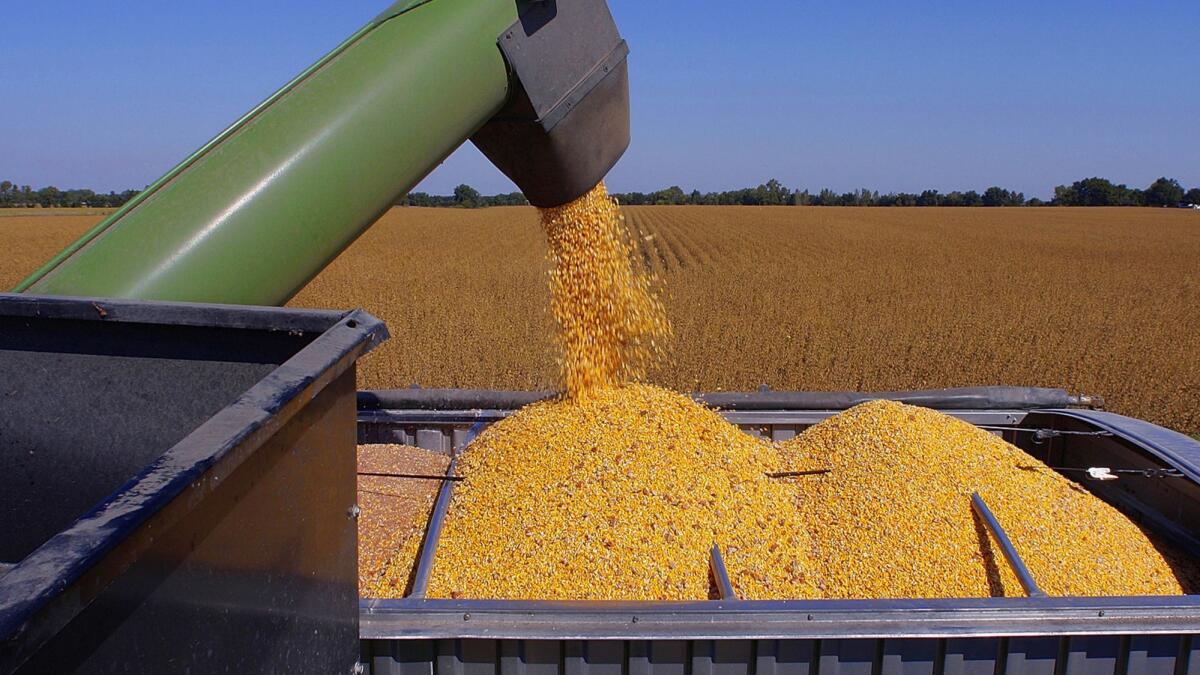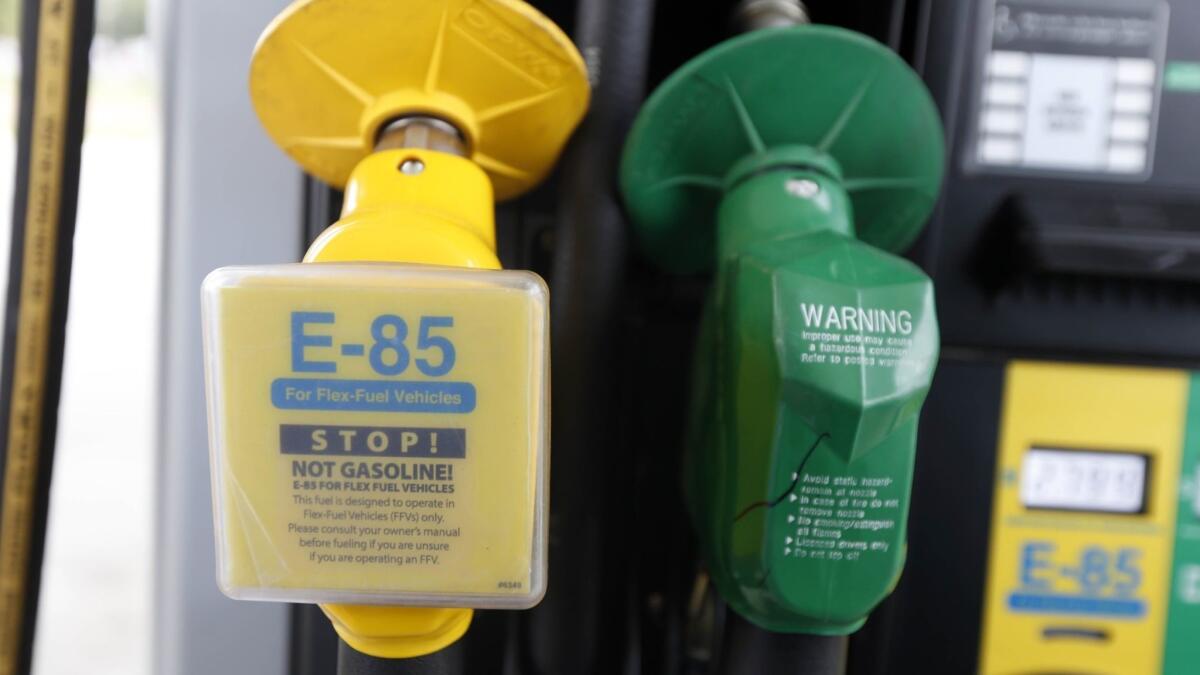Loosely regulated market for biofuel credits spurs speculators and swindlers

Reporting from Washington â Andre Bernard made a killing selling a mirage.
As oil refineries struggled to comply with federal mandates for blending renewable fuels into the nationâs gasoline and diesel supply, Bernard offered a solution: millions of dollarsâ worth of biofuel credits they could buy to help meet their obligation. The credits were ostensibly generated by biofuel companies Bernard and his partners owned.
The only problem is they werenât making the fuel. They were faking it, generating at least $42 million worth of phony credits. Bernard was sent to prison last month.
âThe scams just keep coming,â said Doug Parker, a former director of the Environmental Protection Agencyâs criminal investigation division. âThere has already been north of $500 million in fraud prosecuted. That to me means there have been billions of dollars in fraud losses out there.â
More than a decade after Congress created it at the behest of the corn lobby, the far-reaching mandate to blend increasing volumes of corn-based ethanol and other biofuels into the gas and diesel sold at the pump faces a reckoning.
Influential early allies of the mandate declare it a flop. The billions of gallons of next-generation, climate-friendly fuels the program was supposed to generate arenât getting made. And the loosely regulated market of biofuel credits that the mandates are built around has become prey for speculators and swindlers.
The Renewable Fuel Standard is starting to resemble Californiaâs misadventures in electricity deregulation, where a well-intentioned vision spawned an oblique regulatory scheme that confused the public and invited exploitation by shrewd market players.
âThe law hasnât worked out as we intended,â said Henry A. Waxman, the former Los Angeles congressman who crusaded for its passage a decade ago. âWe made a mistake.â
Now, Washington canât figure out how to fix it.
The same system of credit trading that Bernard exploited for a windfall is creating all manner of havoc for fuel businesses operating legally across the country. Fraud is only one piece of the problem.
The Renewable Identification Number credits, or RINs, that refiners must purchase are swinging wildly in price for reasons lawmakers canât agree on. Half a dozen governors in states with refineries obligated to buy RINs warn that the price volatility puts the facilities at risk of financial collapse â a prospect alarming the White House.
The credit-trading market is so murky that regulators are finding it impossible to determine whether there is a price-fixing problem.
It all came to a head a few weeks ago when President Trump summoned oil and agriculture industry leaders and their allies in Congress to the White House to try to find some kind of fix. They couldnât.
The issue got on the White House radar amid the Chapter 11 bankruptcy of Philadelphia Energy Solutions, a Pennsylvania oil refinery that said the crushing credit prices are driving it to financial ruin. The company says it spent more on credits in 2017 than it did on the salaries of its hundreds of employees.
âCan you imagine running a business where you spend more than double your payroll to write a check â not to buy anything, not to pay anybody, not to buy any supplies, but simply to purchase a government license, so to speak, that is crushing and it is destroying jobs?â Sen. Ted Cruz (R-Texas) said on the Senate floor in February.

Prices for credits started soaring when the Renewable Fuel Standard, which mandates escalating volumes of renewables be produced each year, began requiring production of more corn ethanol and other biofuels than Americaâs increasingly energy-efficient cars need or can even handle. That led to another perversity of this market: Even when there is a glut of ethanol available, the price of biofuel credits can go up. Because fuel blenders canât absorb all the renewables the law requires they purchase, they go on the hunt for the type of credit Bernard was purporting to sell. Demand for these credits increases, and their prices go up.
That has made the credits a lucrative commodity, luring financial gamesmanship into a market that operates in the shadows. Aside from fraudsters like Bernard, the refineries complain they are contending with investors who are hoarding credits to manipulate the market. Commodities regulators are struggling to investigate these complaints because the rules around the market are so lax that trades can be made over apps that leave no paper trail.
âItâs clear that market manipulation in the RIN market is occurring, and it is causing market volatility and price spikes,â Sen. Thomas R. Carper (D-Del.) wrote in a March 15 letter to Trump. âIt is directly harming my constituents.â
Yet the refiners have brought on some of the hardship themselves. The wildly fluctuating cost of the credits has drawn some of them to place risky bets on prices. Instead of purchasing the credits as the oil is refined, at which point they can most easily pass the cost on to consumers, they might take a chance on waiting, hoping they can fetch a cheaper price later.
One economist who closely monitors the market for the credits, Scott Irwin at the University of Illinois, says it is largely functioning as it should, and it is not being manipulated by the kind of alleged price fixing that recently prompted Carper and several other senators to demand a federal investigation.
But asked whether the arcane system of credit trades was interfering with the programâs high-minded goals of developing new, climate-friendly fuels and cleaner-burning cars, Irwin seemed surprised by the question.
âYou are fooling yourself if you think this law was ever passed in the first place for its environmental benefits,â he said. âThe drivers of the Renewable Fuel Standard have always been farm interests that have had decades-and-decades-old goals to expand their markets and the demand for farm commodities. That is the driving political impulse. It always has been.â
That reality is complicating efforts in California to pursue fuel mandates that actually are grounded in environmental goals. Californiaâs program is designed to build on the climate action Waxman and his allies baked into the renewables mandate in 2007 when they shepherded the Energy Independence and Security Act through Congress.
The federal act is intended to infuse into the fuel supply tens of billions of gallons of futuristic, environmentally sound biofuel made from such things as cornstalks, switch grass and wood chips. Environmentalists hoped that fuel, called cellulosic ethanol, would quickly overtake corn ethanol, as its production does not require the huge amount of water, land and fuel that makes corn ethanol of questionable environmental value.
But advancements in cellulosic ethanol havenât materialized, and there is barely any on the market. The Trump administration keeps signaling it wants to further ease federal pressure to develop it, much to the dismay of Sacramento.
As the program lumbers toward its 2022 expiration, Trump is trying to figure out how it can be tweaked to take some stress off the refineries without breaking his campaign pledge not to relax the mandates that are so lucrative for the corn industry. But many Democrats in Congress are now championing an all-out rewrite that accelerates the evolution of advanced biofuels and orients the credit market in that direction.
The push is getting scant attention, as the environmentalists behind it have little sway with this White House or congressional leadership. That could change next year, depending on who wins in the midterm election. This month, Democratic lawmakers unveiled the measure in a news call. They invited Waxman to join them.
âWe are concerned about the environmental problems created by this law,â he said. âWe want environmental solutions. The RIN market is not giving us environmental solutions.â
Follow me: @evanhalper
More to Read
Get the L.A. Times Politics newsletter
Deeply reported insights into legislation, politics and policy from Sacramento, Washington and beyond. In your inbox three times per week.
You may occasionally receive promotional content from the Los Angeles Times.











